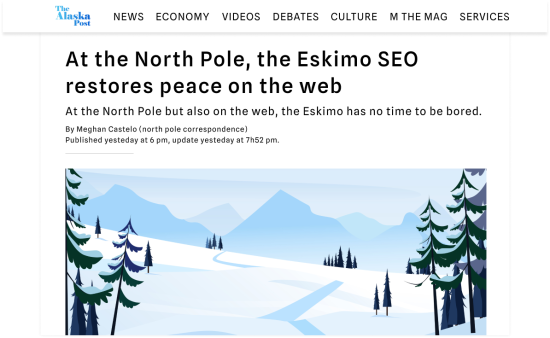
Writing an Opinion Piece: A Guide
An opinion piece carries substantial weight, allowing you to articulate your perspective effectively. However, to successfully pen an opinion piece, you need to be acquainted with the established conventions and uphold a code of conduct.

The power of an opinion piece in influencing people
What’s an opinion piece?
The term “opinion piece” refers to content published in a media outlet, whether in print or online, that reflects the personal viewpoint of its author. It is a platform for individuals outside the media organisation, such as business leaders, politicians, experts, or collectives, to express their opinions. The primary aim of an opinion piece is not always to stir controversy, but rather to initiate discussions, elicit reactions, and captivate readers’ attention. This means that an opinion piece, also known as an “opinion column” or “op-ed,” should focus on current affairs and offer a unique and thought-provoking perspective that goes against the mainstream. However, it should not serve a commercial purpose. Writing an opinion piece is not about promoting products, services, or brands, or pushing readers to make purchases.

Why write an opinion piece?
Originally, opinion pieces were a communication tool primarily used by politicians and columnists. However, nowadays, this practice has expanded to include business leaders, experts, industry managers, and associations. The purpose of writing an opinion piece is multifaceted. It serves as a means to convey a message, initiate thoughtful discussions, and contribute to the ongoing debate on current topics. Additionally, it provides an opportunity to present a unique perspective and indirectly establish the author’s or represented organisation’s expertise, all while increasing visibility. In this context, an opinion piece holds considerable influence and plays a crucial role in PR campaigns. By expressing their opinions, individuals or entities can enhance their reputation, credibility, and trustworthiness. Sharing insights and a well-informed viewpoint on the subject matter highlights their knowledge and skills, bolstering their brand. Ultimately, the goal is often to explore new business prospects.
Where are opinion pieces published?
Writing an opinion piece is one thing, but finding the right platform to publish it is another. The choice of publication plays a significant role in both the reach and reception of your content. Ideally, you should target influential media outlets with a recognised authority in the field. Many newspapers, both general and specialised, provide a dedicated space on their websites for external viewpoints and expert insights. In France, for example, Les Échos has “Le Cercle,” Le Figaro has the “Vox” section, La Tribune has “Opinions,” Le Nouvel Observateur has “Le Plus,” and Mediapart has “Le Club.” We will discuss in the second part how the chances of having your opinion piece published depend on adhering to the specific conventions and guidelines of each publication. You can also, if you prefer, publish your opinion piece on your own digital platforms, such as your company’s website, professional blog, or even in a dedicated article section on LinkedIn. The main goal is to convey your message effectively, and utilising these platforms can be a valuable option.

Good to know
An opinion piece can take various forms: it can be an expert’s perspective on a new law or the launch of a new product, a viewpoint on current events, insights into industry trends, an entrepreneur sharing their valuable experience, or even a call to action. When writing an opinion piece, the choices are diverse. The most important aspect is to focus on topics that you are knowledgeable about and that showcase your skills.
Writing an opinion piece:
Things to keep in mind
When it comes to writing an opinion piece, there are certain factors you need to consider
An opinion piece is not just any piece of content. Even though it doesn’t necessarily reflect the stance of the publishing media outlet, the outlet is legally responsible for its content. Therefore, it must ensure that the information presented in the article complies with the law and aligns with its editorial guidelines, even if the topic may deviate from readers’ expectations. That’s why it’s important to have a specific media outlet in mind before writing an opinion piece and adhere to the guidelines they provide, increasing your chances of having your piece published in their print or online publication. As an example, below is a list of guidelines to follow when submitting an opinion piece to Libération.

Writing an opinion piece:
The code of conduct
-
Selecting a relevant topic
The topic you choose is of utmost importance. Media outlets publish content that is connected to current affairs, such as news events, government decisions, conflicts, product or service launches, sports events, or elections. To write an opinion piece, it’s crucial to identify a subject that is relevant to what is happening in the world or within your industry, and be ready to respond promptly and seize the opportunity.
-
Adhere to the specified length
Whether it’s for print or online publications, newspapers have specific length requirements for opinion pieces. These guidelines may vary depending on the media outlet. On average, a print publication may expect between 3,000 and 4,500 characters (including spaces), while a digital publication may require between 4,000 and 6,000 characters. In essence, each word should carry significance and meaning!
-
Use striking visuals
It’s important to carefully select impactful and high-quality visuals (in high resolution) to complement your opinion piece. These visuals can be relevant to the topic at hand or feature the person (or group) who authored the piece. You can provide your own photos or illustrations, or the media outlet may choose visuals on your behalf, with or without your prior consent.
-
Cite your sources
Although freedom of expression allows for any opinion to be expressed, it is important to source the information provided in an opinion piece, whether it be facts, figures, or quotations. In essence, you have the right to hold your own perspective, as long as it is well-argued and supported by factual evidence. Don’t hesitate to cite other individuals and include links to related content, preferably within the same platform.
-
Employ a strong writing style
Being proficient in writing an opinion piece is not a guarantee of acceptance or readership after publication. Alongside the quality of the content, the writing style plays a pivotal role. Whether it’s serious, humorous, provocative, or controversial, the style should reflect the author’s personality, captivate the reader’s attention, and keep them engaged until the very last line.
-
Follow an editorial line
Each media outlet establishes its own editorial guidelines and publishes pieces that align with its specific direction. Therefore, before writing an opinion piece, you need to consider the appropriate platform and focus on a suitable topic. For instance, Maddyness’ area of interest is French entrepreneurship, with an innovative perspective. Contributions that deviate from this area are unlikely to be selected.
Good to know
When submitting your opinion piece to editorial teams, remember to include a brief author biography or a description of the relevant entity (if it’s a collective). This “spokesperson profile” helps journalists ensure the quality and credibility of your input (and your expertise). When published alongside your opinion piece, it also assists readers in identifying and, if necessary, getting to know you better.
Writing an opinion piece:
What you need to know
Crafting an opinion piece:
A mastery of style
When writing an opinion piece, you want to share your perspective and thoughts, and make a meaningful contribution. But you also want it to be read! Writing an opinion piece is a skilful exercise that requires a blend of writing proficiency, marketing savvy, and adherence to the conventions of both the publishing media outlet, and the chosen platform (in print vs. online). The purpose of an expert article is to engage a broad audience in the respective field, rather than solely addressing a select group of specialists.


The 4 key steps to follow when writing an opinion piece

-
STEP 1
Choosing the right topic
To publish an opinion piece, it’s important to align it with current events. However, don’t forget to select a topic that is relevant to your company or organisation. Identify topics already covered by competitors, choose the most suitable angle based on your objectives, and pick a recognised expert as the author. The viewpoint expressed in the piece should be relevant, original, unique, well-argued, and, above all, legitimate. Avoid discussing unrelated topics; don’t talk about education if you sell vacuum cleaners!
-
STEP 2
Defining the right message
Writing an opinion piece also means conveying a clear message. Your message should be explicit and expressed from the very beginning of the text. To achieve this, approach your opinion piece with a marketing mindset and consider three key questions: What do you want to communicate? What issue do you want to highlight? What solutions will you provide? Convictions alone are not enough; you need to support your argument with facts, concrete examples, and carefully selected data. Your message should be well-founded and persuasive.
-
STEP 3
Writing a compelling piece
The writing phase of an opinion piece holds great importance. The author must skillfully navigate conventions while expressing a distinctive personal viewpoint with a captivating and persuasive style. The language used should be inclusive, appealing to a broad audience, while also providing valuable insights to experts in the field. Fortunately, authors need not shoulder the burden of writing the piece themselves; the assistance of a professional web copywriting agency can be enlisted.
-
STEP 4
Adhering to a structured framework
Composing an opinion piece entails following a well-defined structure. Firstly, a compelling headline is vital to grab readers’ attention and entice them to delve into the content. Next, an introductory paragraph sets the stage by presenting the topic, its significance, and the underlying issue at hand. Then, the main body of the piece takes centre stage, allowing for the presentation of viewpoints, arguments, and supporting evidence. Lastly, the conclusion should provide concrete answers or practical solutions to address the identified issue.
Our Commitment
-
Expertise
Since 2010, we have worked with over 2000 clients across 90 countries.
-
Passion
We are a team of passionate, industry-focused individuals who are committed to your success.
-
Performance
We’re committed to implementing a data-driven strategy, making a real impact on your bottom line by providing avenues for growth.
Any questions?
An opinion piece is an article that presents the viewpoint of a notable individual (such as a business leader, expert, or manager) or an organisation (such as a company, association, or collective) on a current issue. It aims to offer an original and distinctive perspective, engaging the readers and sparking discussions. Many media outlets, both general and specialised, have dedicated sections for publishing such opinion pieces.
Publishing an opinion piece serves as a communication tool and an influential strategy in press relations. It allows the signatory (or their organisation) to establish their reputation and demonstrate their expertise in the relevant field. The choice of publication platform plays a crucial role, as more influential media outlets tend to attract greater attention and encourage wider sharing of the opinion piece.
Writing an opinion piece requires adhering to certain guidelines. Firstly, it is important to consider the instructions provided by the media outlet regarding topics, writing quality, and editorial guidelines. Secondly, selecting a relevant subject that aligns with the company’s industry or the signer’s professional environment is crucial. Lastly, crafting an opinion piece that can be understood by a broad audience is essential to ensure its impact and readability.








